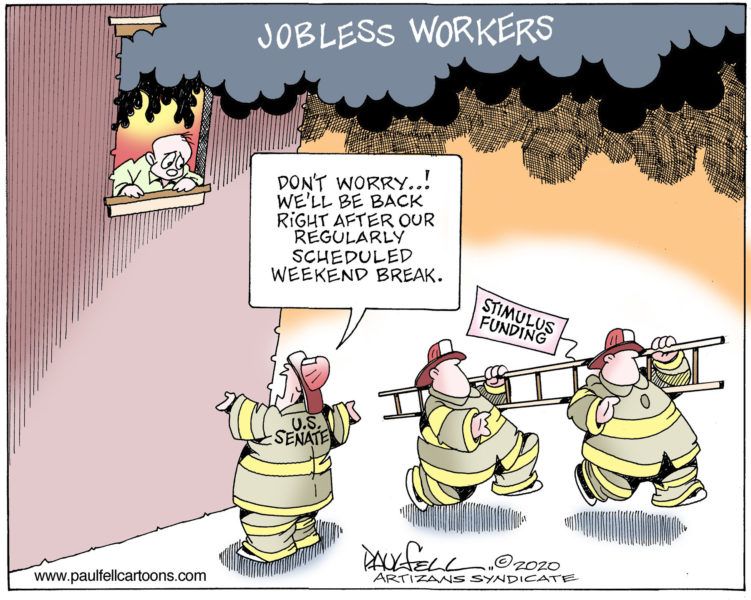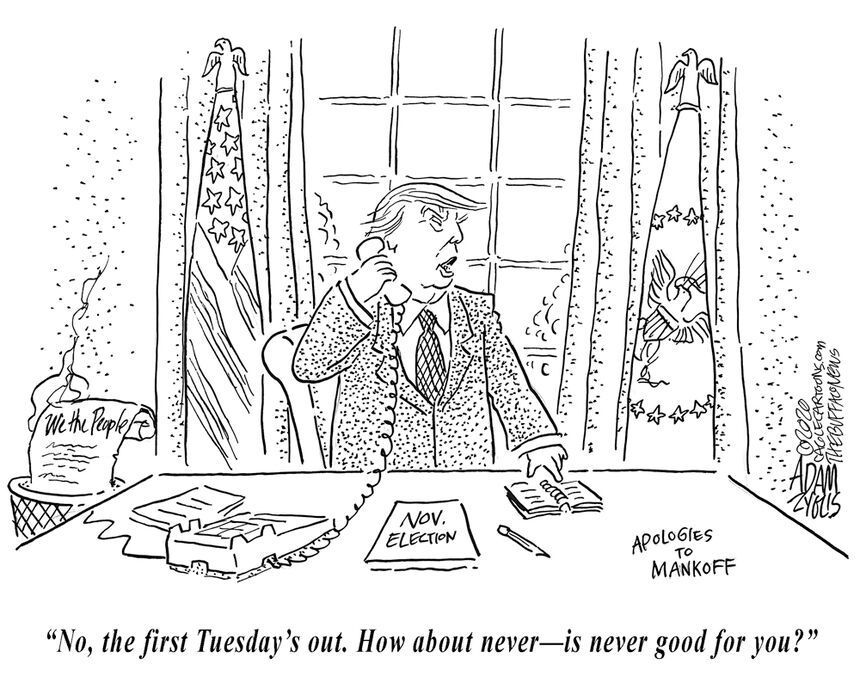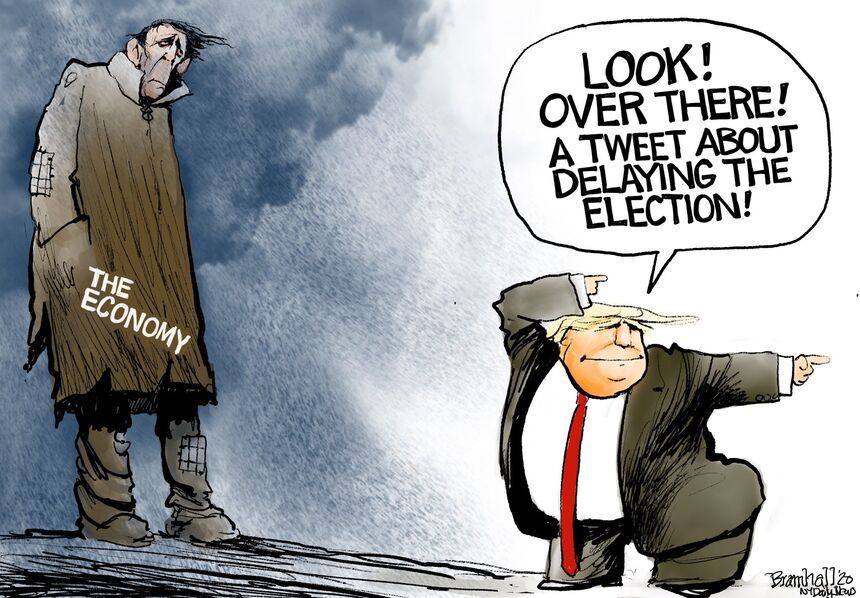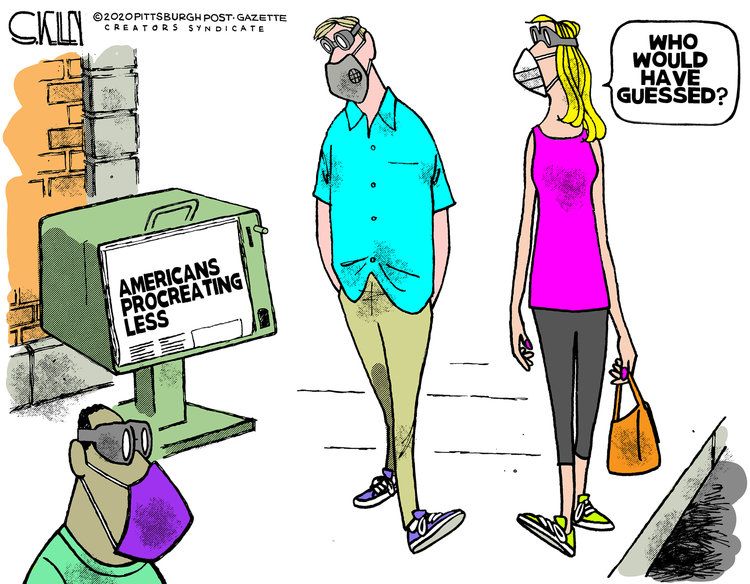CSotD: Conspiratorial Comix
Skip to comments
Matt Wuerker starts off today’s review of conspiracies with the widespread notion that the stock market is reflective of the overall economy.
As he notes, the connection between the Dow Jones and how average people live is tenuous at best and, at the moment, we’re not “at best.”
The market is inbred: It’s no longer about the competitive value, say, of Acme Air Conditioners in the marketplace, but about the value of Acme stock and the ability of Acme management to raise profits, even if it means firing their American workers and moving the factory to Mexico or China.
Donald Trump promised to bring manufacturing jobs back, but it hasn’t happened, nor will it, barring a major restructuring of the world economy and, trust me, you don’t want to live through that.
And you might not.
There was a time when the price of a stock reflected the real health of the company, but that was back when companies did things. In the current system of megacorporations owning a variety of unrelated businesses, their job is not to make things but to make profits.
Which, as Wuerker points out, leaves most of us watching from the sidelines.
There was a point, around the turn of this century, when the oil companies were being criticized, and their response was to remind us that we own stock in oil companies, which was true except for being a load of horsepucky.
Their actual claim was that your pension or, more likely, your 401k, contained various stocks that included holdings in oil companies. So it’s true except that you have no possible power to influence anything in those companies and often no power to even choose if you want your retirement to include them at all.
In “The Solid Gold Cadillac,” Judy Holliday’s character amasses small-investor proxies until she has gained the power to thwart the corrupt board of directors, but that was a comedy for good reason: Proxies are a joke.
Some companies these days do give up more than 49% of their voting stock, but it’s purchased by holding companies and individual stockholders like you and me, even if we banded together, couldn’t budge things.
And the disconnect between stock prices and ground-level economics is only one part of a system that has become increasingly theoretical.
The value of the dollar is based on what people agree the value of the dollar is, though, in all fairness, even when it was based on the value of gold, the value of gold was simply an agreed-upon figure.

At the moment, as Paul Fell points out, all Congress has been able to agree on is that they should take the weekend off.
President Trump declared the other night that the Democrats were holding up an agreement on the next stimulus package.
He didn’t go into details, such as the Democrats objecting to a provision limiting employers’ liability for allowing the spread of coronavirus in the workplace, and their belief that, if we could fit $680 million worth of fighter jets into the package, we could afford to give workers enough unemployment to feed their children and avoid eviction.
And, speaking of somebody facing eviction, here’s our first
Juxtaposition of the Day



Other cartoonists should look upon this collection and weep, because it’s all brilliant stuff.
Cole sets the scene of a cornered president facing extraordinarily bad polls. Pundits have said not to get too comfortable, and I agree with that, but those who point out that Hillary Clinton also led in the polls are ignoring the relative sizes of those spreads, while I also saw someone point out similar gaps — only they were the normal post-convention bubbles that rise and fade and signify nothing.
Zyglis riffs masterfully on a classic Bob Mankoff gag, indicating what Dear Leader would really prefer: Not a delay or a rescheduling of the election, but calling it off entirely.
And Bramhall provides an explanation for why Dear Leader made his absurd, undoable, illegal proposal when he did: To distract from the astonishing cratering of our overall economy.
Which brings us back to Wuerker’s cartoon, since GDP is also one of those economic indicators that live out in Theoryland. Having GDP fall by a third isn’t nearly as significant as having unemployment claims skyrocket. Which they did.
And to which the leader of our nation responds, “Squirrel!”
Meanwhile, back at the lunatic asylum, our other
Juxtaposition of the Day



As noted the other day, and amplified here by Lee Judge, it’s astonishing that Trump didn’t back away from his claims about hydrochloroquine, but he’s not even backing away from the doctor who believes in that discredited treatment and also that witches and warlocks walk into her clinic alongside demons.
And I feel bad for poor, loyal Herman Cain, but Louis Gohmert has not only proclaimed that he caught the virus because he wore a mask but has announced that he’s treating it with the aforementioned quackery.
Well, not the part about having sex with demons or using space alien DNA in drugs. Just the pills that don’t cure Covid-19.
Still, he surrenders most of any sympathy his plight provided.
However, Mike Lester insists that it’s not all quackery and insane delusions, and that the only reason people are being deprived of hydrochloroquine and the advice of the Doctor of Demonology is a conspiracy among Democrats to steal the election.
Assuming we ever have one.

Finally, Steve Kelley notes what is surely one of the most counterintuitive projections in a very long time, that the birth rate around the world will fall because of the pandemic.
I’m as skeptical of those reports of mini-baby-booms following hurricanes or massive power failures as I am of people who claim crime rises under a full moon.
Still, given all the moaning over there being nothing to do, I’m having trouble accepting the idea that we won’t see a lot of kids arrive just in time for Christmas.
The gift that keeps on giving!
Comments 5
Comments are closed.